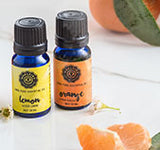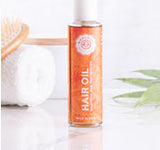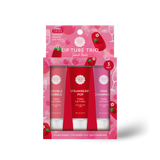Tips and Tricks for Dealing with Anxiety and Panic Attacks

Racing heart?
Fearful thoughts?
Chest tightness?
These are all hallmarks of anxiety and panic disorder.
If you're struggling with debilitating anxiety, you're not alone! Keep reading as we explore tools to reduce panic and bring you back to a state of calm.
What causes anxiety and panic attacks?
Anxiety and panic attacks are symptoms of a heightened stress response. When you're under stress, your body initiates the sympathetic nervous system - known as the "fight or flight" response - to protect you. Normally you'd move out of this state quickly when the threat passes. Unfortunately, if you have anxiety, your brain continues to perceive danger, causing ongoing emotional and physical symptoms such as:
- Fear
- Repetitive thoughts
- Catastrophic thinking
- Rapid breathing
- Shortness of breath
- Racing heartbeat
- Chest pain and tightness
- Trembling
- Dizziness
- Fainting
Here are 5 tips for soothing anxiety and moving your nervous system out of fight or flight mode:
1. Grab your essential oils
Aromatherapy is a powerful anxiety "hack". The plant aromas distract and ground you, pulling you out of anxious thinking.
Lavender oil has sedative properties, which helps you sleep when you're tossing and turning from anxiety (1). We recommend keeping a lavender roll-on in your bag or next to your bed. Apply it to your pulse points or take a deep breath directly from the bottle for quick relief.
Our Woolzies Stress Relief Blend is a calming citrus oil ideal for soothing the nervous system - it contains lavender, rose, vetiver, ylang ylang, bergamot, chamomile, and frankincense.
2. Slow your breathing and breathe into your belly
Breathing at a slow and rhythmic pace reduces anxiety. However, it can feel challenging to slow your breathing during a panic attack. Instead of putting pressure on yourself to breathe perfectly, focus on counting as you breathe and moving your breath into your belly.
The next time you feel out of control, breathe in through your nose for a count of two. Breathe out slowly through your mouth for a count of four. The extended exhale stimulates parasympathetic nervous system activity (2).
We suggest pairing essential oils with deep breathing. Dab Woolzies Breathe Blend onto your pulse points before doing a belly breathing exercise.
3. Ground yourself with your senses
Focusing on your senses is a well-known practice to move into the present moment.
- Name an object you can see in the room.
- Listen for something you can hear in the immediate environment.
- Touch an object and name what it is and how it feels.
- Identify something you can smell - essential oils, coffee, cooking, perfume.
This exercise grounds you and distracts your brain from anxious thoughts.
4. Try humming
Chanting and humming are ancient meditative practices used around the world. But they're not just for yogis and spiritual gurus! Humming, chanting, and singing slow your breathing rate down and create a vibration that stimulates your vagus nerve (3).
Try the "Om breath" to bring your stress levels down:
- Breathe in through your nose for a count of 4 into your belly.
- Hold gently for a second at the top.
- Close your mouth and make a low "ommm" sound as you empty your lungs of air.
- Repeat for 5 minutes or until you feel calmer.
5. Have a cold shower
Have you heard of cold therapy?
Cold exposure therapy may sound crazy, but cold therapy could be what you need to snap you out of anxious thinking. After the initial shock of the cold, your body senses there is no threat and sends a message to your brain to shift you into a calm state (4).
Start by taking a 10-second cold shower and working your way up to 30 seconds, 1 minute, and eventually 2 minutes. If you're feeling brave, you can also try cold-water swimming!
Wrapping up
There is no quick fix for stress, anxiety, and panic attacks. However, the tips mentioned above can improve your quality of life and bring you back into the present moment.
They can give you the clarity needed to address your mental health and, if necessary, speak to a trusted professional.
Resources
- https://www.sciencedirect.com/science/article/pii/S0944711319303411?via%3Dihub
- https://www.ncbi.nlm.nih.gov/pmc/articles/PMC6137615/
- https://pubmed.ncbi.nlm.nih.gov/35444369/
- https://pubmed.ncbi.nlm.nih.gov/18785356/
Suggested Posts
Tips and Tricks for Dealing with Anxiety and Panic Attacks
Racing heart? Fearful thoughts? Chest tightness? These are all hallmarks of anxiety and panic disorder. If you're struggling with debili...
Focus on: Cedarwood Essential Oil
Are you looking for a warming essential oil with a woody aroma and grounding properties? Woolzies Cedarwood Essential Oil has a beautifu...




